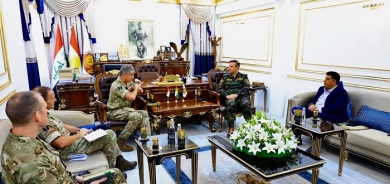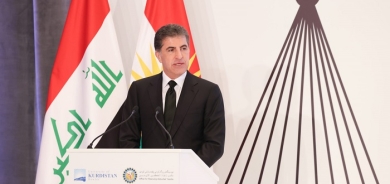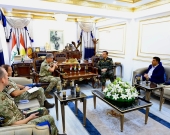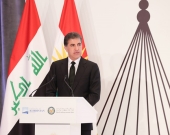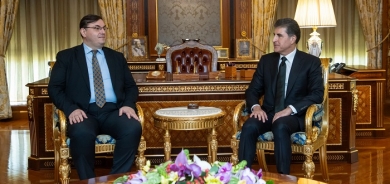Pro-Kurdish Party’s Emergence in Turkey Could Shake Up Election
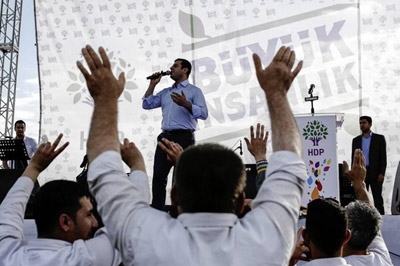
ISTANBUL—As a 20-year-old student, Selahattin Demirtas tried and failed to join Kurdish guerrillas waging war against the Turkish state.
Two decades later, Mr. Demirtas could have more success changing Turkey—this time through the system. As the most competitive parliamentary election in a decade approaches, his party has emerged as a potential spoiler to President Recep Tayyip Erdogan’s plans to cement his grip on power.
Mr. Demiras, a confident and charismatic 42-year-old lawyer, is transforming the Peoples’ Democratic Party, or HDP, from a dedicated Kurdish faction into a mainstream liberal party. Its rise is emblematic of the growing influence of the Kurds, not only in Turkey, but across the region, including in Syria and Iraq where self-governing Kurdish communities are rare islands of stability.
The latest polls suggest the party could squeak past the 10% electoral threshold needed to get representation in Turkish parliament, enough to deny Mr. Erdogan’s Islamic-rooted Justice and Development Party, or AKP, a supermajority.
The HDP’s performance on June 7 could also affect the balance of power in the precarious peace process between the government and the outlawed Kurdistan Workers’ Party, or PKK, aimed at ending a three-decade insurgency that has cost some 40,000 lives.
The HDP’s campaign has shifted its focus to promoting democracy, free speech and the rights of women and minorities. Many Turks in this country of 76 million are suspicious of the party and its historic ties to militants. But the HDP is increasingly appealing to young, secular Turks weary of Mr. Erdogan’s dominance.
“In this high-stakes election, it all hinges on the HDP. The AKP has been dominant for more than a decade but they’re now incredibly vulnerable, largely because of one single party, the HDP,” said Wolfango Piccoli, managing director of Teneo Intelligence, a London-based risk consultancy.
The AKP, which has won nine back-to-back elections and other votes since sweeping to power in 2002, is still Turkey’s most popular party. Recent polls, however, suggest its lead is narrowing as voters fret about the weakening economy.
Mr. Erdogan was elected president last year after he hit his term limit as prime minister. He now hopes to change the presidency from a ceremonial role to an executive one.
If Mr. Demirtas’s party hits the threshold to enter parliament, it is expected to get 50 of the 550 seats, which would be enough to stop the AKP from getting the three-fifths supermajority to overhaul the constitution and beef up the president’s role.
If the HDP doesn’t bridge the 10% threshold, it will be locked out of parliament.
“By becoming the smallest party in parliament, we can curb the power of the biggest party,” Mr. Demirtas said in a recent interview. “The AKP is very nervous. They didn’t expect this challenge.”
Mr. Erdogan and Prime Minister Ahmet Davutoglu have launched increasingly vocal attacks against Mr. Demirtas, labeling him the pawn of PKK militants.
Deputy Prime Minister Yalcin Akdogan, the government’s chief peace negotiator with the PKK, said last week that the HDP was pursuing a “plan of chaos” to reignite violence in the Kurdish-dominated southeast.
Mr. Demirtas, who grew up with six siblings in the shadow of the state-PKK conflict, denied those accusations, stressing that his party wouldn’t jeopardize the talks. “We will not and we cannot allow the war to restart just because we couldn’t enter parliament,” he said.
Though relations between the country’s 15 million Kurds and the government have improved considerably, the Kurdish region is still poor and many feel disenfranchised.
A ballot disappointment could spark protests, but wouldn’t necessarily doom the peace process.
“I don’t believe the war would restart. But if the Kurds become convinced that they cannot be integrated into Turkey’s politics, then they could start making different plans for themselves,” said Cengiz Candar, an expert on the Kurdish conflict.
Mr. Demirtas became involved in activism as a student at the height of the violence in the 1990s. Like many of his contemporaries, he made plans to join the PKK, but failed after his recruiter was arrested. He was detained and chose another path.
After completing his studies he worked as a human-rights lawyer in Turkey’s de facto Kurdish capital, Diyarbakir, before entering politics.
“Many of my friends were killed in clashes and prisons,” Mr. Demirtas said. “What pushed the youth into joining the militants were the conditions, and those conditions haven’t yet changed that much. We want to turn the youth to politics.”
“It’s important that a Kurdish politician has come to the point of speaking to a wider society. We have managed to become a party beyond ethnic identity,” he said.
Voters who came to see Mr. Demirtas in an Istanbul park recently echoed that sentiment.
“I’m voting for the HDP for the first time. I like their message and I’m strongly against the AKP and their plan to change the presidential system,” said Ayse, a 41-year old former supporter of the main secularist opposition party.
Despite Mr. Demirtas’s relaxed style and increasingly slick political campaign, others are still unswayed.
“Demirtas is great and I like his message. But I’m just not sure I relate to the Kurdish nationalist profile,” said Serra Ayar, a 59-year graphic designer who supports the secularists.
“I feel this election is an important opportunity to stop the AKP. I will keep watching the HDP.”
The Wall Street Journal




